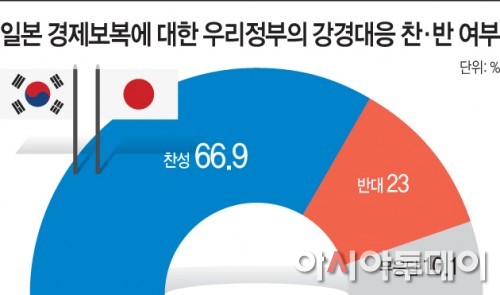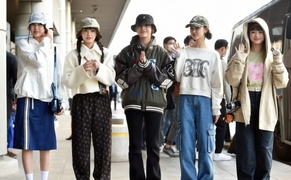 |
By AsiaToday reporter Lim Yoo-jin
More than three out of ten South Koreans think that the government should “take strong measures against Japan’s export curbs even if the country suffers economic disadvantage”, a new poll showed on Monday.
It was followed by “resolving the issue diplomatically” (33 percent), “taking corresponding measures by filing a complaint with the World Trade Organization” (16.1 percent), “considering abolishing the General Security of Military Information Agreement (GSOMIA) between Seoul and Tokyo” (4.6 percent), and “accepting Japan’s call for third-party arbitration” (3.7 percent).
With 35.5 percent of respondents calling for the government’s “strong action despite economic disadvantages”, 16.1 percent requesting “corresponding measures by filing WTO complaint”, and 4.6 percent demanding “abolishment of GSOMIA”, more than half of South Koreans (56.2 percent) called for the government’s strong measures.
The results were based on a regular public survey by R&Search on behalf of AsiaToday conducted during the fourth week of July. It had plus and minus 2.9 percentage points in margin of error with a 95 percent confidence level.
“People have shown different reactions to the government’s corresponding measures depending on their political views, however the survey shows anti-Japan sentiment is growing regardless of political tendency,” said Kim Mi-hyun, director general of R&Search. “The results reflect people’s willingness to blame Japanese Prime Minister Shinzo Abe for his wrongdoing while supporting the South Korean government and the president.”
Regarding Moon’s policy towards Japan’s export control, more than half of respondents (53.5 percent) evaluated positively, with 34.1 percent assessing Moon’s job performance “excellent” and 19.4 percent “good”. On the other hand, 41.4 percent of respondents were unsatisfied.
“In general, Moon’s approval rating is under 20 to 30 percent in Daegu and North Gyeongsang Province, but this time, 40 percent of respondents in this region assessed positively,” Kim said. “It reflects people’s intention to support Moon’s corresponding measure against Japan’s export control.”
Regarding deepening boycotts of Japanese products, seven out of ten people were in support of the boycott campaign, with 53.2 percent being “very supportive” and 20 percent “supportive”. On the other hand, 10.1 percent were “very opposed” and 12.1 percent “opposed” the boycott campaign. By age group, those in their 40s were the most likely to support the campaign with 81.4 percent.
#survey #Moon Jae-in #Japan #export curbs #corresponding measures
Copyright by Asiatoday
Most Read
-
1
-
2
-
3
-
4
-
5
-
6
-
7





















